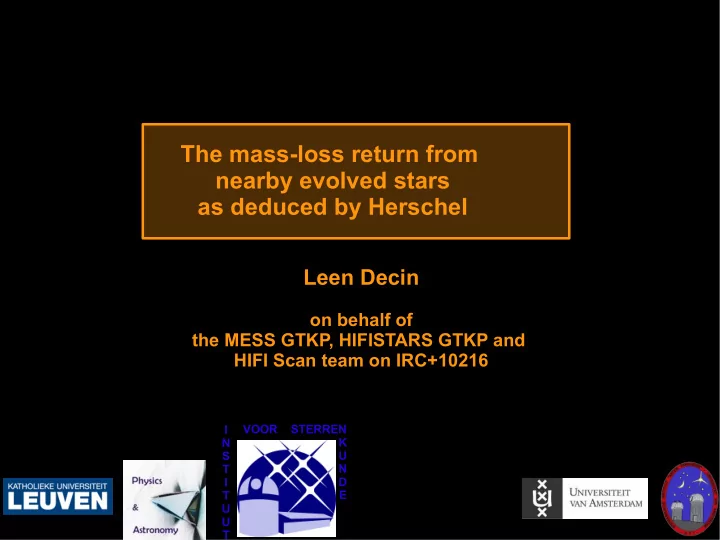

The mass-loss return from nearby evolved stars as deduced by Herschel Leen Decin on behalf of the MESS GTKP, HIFISTARS GTKP and HIFI Scan team on IRC+10216 I VOOR STERREN K N S U N T I D E T U U T
Stellar mass loss: the Sun . M~2*10 -14 M sun /yr
Stellar mass loss: red giant . M~10 -8 - 10 -4 M sun /yr
Stellar mass loss: Luminous Blue Variable . M~10 -4 M sun /yr
Importance of mass loss of evolved stars Cosmic Chemistry Cycle
Importance of mass loss of evolved stars Cosmic Chemistry Cycle Important: * chemical elements created in stellar core * enrichment of interstellar medium via mass loss Carbon on Earth forged by evolved stars
It's cool ... + circumstellar gas and dust: 10 - 1000K
... and complex Evidence for overall spherical symmetry (Guélin et al. 1993)
... and complex Evidence of departure from overall spherical symmetry 2.2' 1¨ 2.5' (Mauron & Huggins 2000) (Weigelt et al. 1998) (Groenewegen et al. 1997)
... and complex
Chemistry in evolved stars
1. Non-equilibrium chemistry
1. Non-equilibrium chemistry (IK Tau, Decin et al. 2010) Few lines – long integration times
1. Non-equilibrium chemistry O-rich supergiant VY CMa Spectral movie of VY CMa Herschel-PACS (4400 sec) ISO-LWS (1930 sec) Royer et al. 2010 Matsuura et al. 2012
1. Non-equilibrium chemistry
1. Non-equilibrium chemistry Royer et al. 2010 [SiO/H 2 ]=4.5 · 10 -5 [H 2 O/H 2 ]=3 · 10 -4 [HCN/H 2 ]=4.5 · 10 -6
1. Non-equilibrium chemistry Royer et al. 2010 [SiO/H 2 ]=4.5 · 10 -5 [SiO/H 2 ]=3.5 · 10 -5 [H 2 O/H 2 ]=3 · 10 -4 [H 2 O/H 2 ]=7 · 10 -5 (TE) [HCN/H 2 ]=4.5 · 10 -6 [HCN/H 2 ]=6 · 10 -11
1. Non-equilibrium chemistry Royer et al. 2010 [SiO/H 2 ]=4.5 · 10 -5 [SiO/H 2 ]=3.5 · 10 -5 [H 2 O/H 2 ]=3 · 10 -4 [H 2 O/H 2 ]=7 · 10 -5 (TE) [HCN/H 2 ]=4.5 · 10 -6 [HCN/H 2 ]=6 · 10 -11 NON-TE (Duari et al. 1999)
2. Gas-grain reactions
2. Gas-grain reactions OH127.8+0.0 Lombaert et al. 2012
2. Gas-grain reactions OH127.8+0.0 low dust-to-gas, high water abundance high dust-to-gas, low water abundance Lombaert et al. 2012
2. Gas-grain reactions OH127.8+0.0 low dust-to-gas, high water abundance high dust-to-gas, low water abundance Lombaert et al. 2012
2. Gas-grain reactions OH127.8+0.0 low dust-to-gas, high water abundance high dust-to-gas, low water abundance Lombaert et al. 2012
2. Gas-grain reactions OH127.8+0.0 low dust-to-gas, high water abundance high dust-to-gas, low water abundance Lombaert et al. 2012
2. Gas-grain reactions OH127.8+0.0 Lombaert et al. 2012
2. Gas-grain reactions
2. Gas-grain reactions IK Tau – HIFI + ground-based observations Decin et al. 2010
2. Gas-grain reactions O-rich AGB stars: HIFI observations v=v 0 +(v e -v 0 )[1-E 0 /E] β v turb ? Justtanont et al. 2012
3. Photodissociation and ion-molecule reactions
3. Photodissociation and ion-molecule reactions Warm water in the sooty outflow of the luminous carbon star IRC+10216 Decin et al. 2010, Nature
3. Photodissociation and ion-molecule reactions (Decin et al. 2010, Neufeld et al. 2011)
3. Photodissociation and ion-molecule reactions Melnick et al. 2001 sublimation of icy bodies
3. Photodissociation and ion-molecule reactions (Melnick et al. 2001) (Cherchneff 2006) (Agundez et al. 2006) (Willacy 2004) vaporization of icy bodies shock-induced radiative association O+H 2 H 2 O: grain surface reactions chemistry
3. Photodissociation and ion-molecule reactions Weigelt et al. 2002
3. Photodissociation and ion-molecule reactions Cherchneff 2011 Weigelt et al. 2002
3. Photodissociation and ion-molecule reactions Weigelt et al. 2002 Mamon et al. (1999, 2000), Leao et al. 2006 IRC+10216 arcs from 4” to 80” 100 mas
3. Photodissociation and ion-molecule reactions Weigelt et al. 2002 Mamon et al. (1999, 2000), Leao et al. 2006 IRC+10216 arcs from 4” to 80” 100 mas Herschel PACS Decin et al. 2011 70 μm 100 μm 160 μm 10' x10'
3. Photodissociation and ion-molecule reactions Weigelt et al. 2002 Mamon et al. (1999, 2000), Leao et al. 2006 IRC+10216 arcs from 4” to 80” 100 mas Herschel PACS Decin et al. 2011 100 μm influence gas-phase chemistry arcs from 23” to 320”
3. Photodissociation and ion-molecule reactions C 2 H in IRC+10216 (De Beck et al. 2011) I R A M H E R S C H E L C 2 H 2 +h ν C 2 H+H
3. Photodissociation and ion-molecule reactions C 2 H in IRC+10216 (De Beck et al. 2011) without density enhancements including density enhancements
4. CSM-ISM interaction
4. CSM-ISM interaction CW Leo PACS 160 μm 16' x 11' CSM-ISM interaction region at ~450 – 480” (Ladjal et al. 2010)
4. CSM-ISM interaction blue: PACS 70 mic; green: PACS 160 mic; red: SPIRE 250 mic Decin et al. 2012
4. CSM-ISM interaction Cox et al. 2012
4. CSM-ISM interaction Morphological Classes Cox et al. 2012 #6 #22 Eyes Fermata 53 out of 81 objects show interaction! #6 #14 Rings Irregular
4. CSM-ISM interaction higher v BASIC MODEL higher T ISM higher Mdot low dust content low ISM density
4. CSM-ISM interaction Turbulent instabilities New hydro code: AMRVAC (Van Marle et al. 2011) Large scale 'KH' vortices downstream Hydrodynamical simulations: Kelvin-Helmholtz & Rayleigh-Taylor instabilities
4. CSM-ISM interaction Hydrodynamical simulation gas density gas velocity gas temperature ρ wind / ρ total Decin et al. 2012
Chemistry in evolved stars
Recommend
More recommend